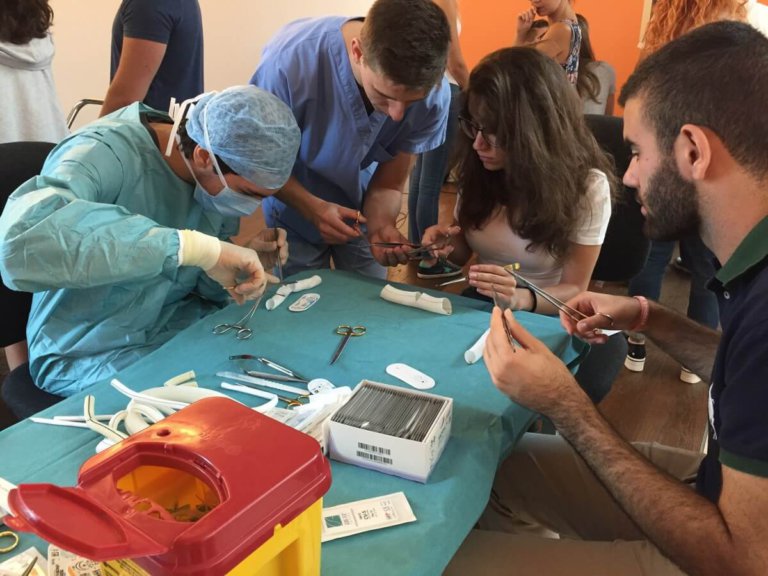
A renowned healthcare institution, Humanitas University in Milan has just added a new medical course to an already progressive programme collection; one in which students become doctors equipped with an additional degree in biomedical engineering.
Attracting and retaining student talent from Italy and abroad, Humanitas has become an international hub for the education of physicians, nurses and researchers capable of coping with future scientific, technological and social evolution.
With access to Humanitas’ first-rate hospital facilities, cutting-edge research, integrated curriculum and international learning environment, this is a dynamic springboard for success-driven biomedical engineers.
That’s why all university tutors are specifically trained and work as medical doctors or nurses in the hospital, and all campus facilities are located within the hospital area, connecting courses to industry.
Brand-new medical course with biomedical engineering
This six-year medical degree taught in English, named MEDTEC School, will supply students with an established degree in both medicine and biomedical engineering.
In collaboration with Politecnico di Milano, Humanitas University is the first university in Italy to offer this sort of programme.
Once graduated, you’ll understand and consciously manage the advanced technologies that characterise today’s medical profession, also gaining the ability to apply increasingly personalised medicine using systems of high technological complexity for the treatment of patients, as well as clinical evaluation and diagnosis.

Source: Humanitas Unversity
Along with these attributes, you’ll also be able to optimise therapeutic results through data analysis and machine learning techniques, as well as the use of new materials and advanced therapeutic devices such as surgical robots, endoprostheses, biostamps and 3D prints.
With the MEDTEC School degree on your side, you’ll find employment not only in sectors of the medical profession and research, but also in the industrial sectors that operate in the design of biomedical devices and technologies or the pharmaceutical sector.
What else does the MEDTEC School course offer?
Integrating interactive methodologies such as research-based learning, problem-based learning, case method and a skills portfolio, this new medical and biomedical engineering course offers a solid integration between theoretical concepts and the practical aspects needed to develop an autonomous and critical reasoning ability.
You’ll attain a higher level of study on the basic subjects that are integral to biomedical engineering, such as chemistry, physics, statistics and computer science, and you’ll acquire the skills needed to deal with issues related to precision and regenerative medicine.
Experience the integration of pre-clinical and clinical preparation at Humanitas, with related teachings such as mathematical analysis, computer science, electrical engineering and mechanics – all of which are useful in building a solid foundation in engineering.
By giving you core and contemporary skills, you’ll address complex issues in the applications of technology and information analysis to medicine.
This innovative approach to doctor-patient interaction allows you to make the most of new technologies and intelligent systems, as well as the influence of the medical sector.
You’ll also optimise machine-patient interaction, customise therapies to suit patients and revise the continuity of care to facilitate cross-fertilisation between medical training and basic engineering training.
On September 6, 2019, the entrance test carried out by Humanitas University, in collaboration with the Politecnico di Milano, takes place.
Registrations for the admission test will open in July via the website and this will be a multiple-choice test, entirely in English. The questions will cover mathematics, verbal logic, physics, chemistry, biology and technical-scientific culture.
For this first academic year, the new course will be open for Italians and Europeans and the university will have around 50 available seats.
In the first three years of the course, semesters will be held at the Politecnico di Milano, while second semesters will take place at Humanitas. This balance allows you to experience the mix of medical and engineering knowledge from the very start of your biomedical engineering venture.
The next three years will be dedicated to clinical training and teaching activity is organised by Humanitas University for both frontal lessons and professional activities. This three-year period includes monodisciplinary courses and integrated courses, delivered by both Politecnico and Humanitas teachers.
In some courses, teachers of the two universities will be co-present in the classroom to ensure the full integration of skills, while the same approach of co-tutoring will also be adopted for some professional preparation involved in doctor training.
Through active learning methods, students are encouraged to interact in small groups and develop critical thinking and problem-solving skills. These methods, along with the clinical experience, are supported by a strong tutoring system with a high tutor-to-student ratio.
If you’re interested in kickstarting your career with the new MEDTEC School programme with biomedical engineering at Humanitas, and you want to find out how to get involved, including updates on entry dates, click here and contact the team today.
Start your exclusive biomedical engineering experience in Milan today and see where it takes your medical career!
Follow Humanitas University on Facebook, YouTube, Instagram and LinkedIn
Liked this? Then you’ll love…
Leading European universities for future medical professionals
Humanitas University: Empowering medical graduates to make strides in their field







